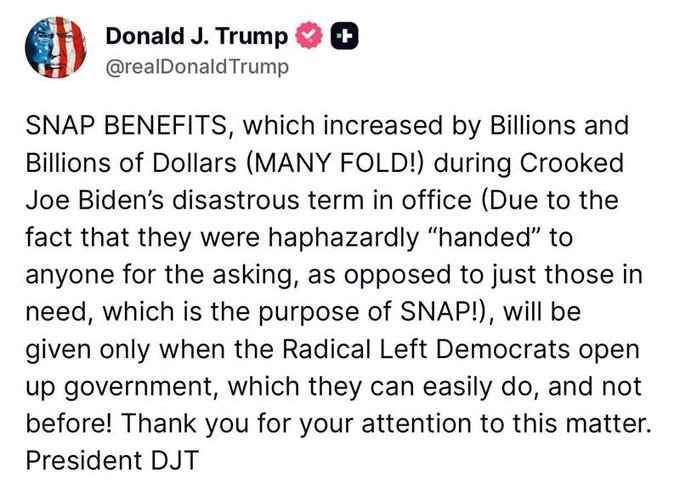You are using an out of date browser. It may not display this or other websites correctly.
You should upgrade or use an alternative browser.
You should upgrade or use an alternative browser.
Shots fired!
- Thread starter Diogenes
- Start date
And you actually believe him huh
Why wouldn't I, Desh?
evince
Truthmatters
Good pointWhy wouldn't I, Desh?
Cultist never question their leader
Good point
Thanks, Desh.
Cultist never question their leader
I wouldn't know, Desh, but it seems that you have some life experience in that regard. Who's the leader of your cult, then? Does it have a name?
Tbird19482
Verified User
Well stupid MAGAS like him sometimes wonder why Trump loves them well Trump did come right out and told them he LOVES STUPID people because they are so stupid they believe everything he says.
Well stupid MAGAS like him sometimes wonder why Trump loves them well Trump did come right out and told them he LOVES STUPID people because they are so stupid they believe everything he says.
Is that so?
Tbird19482
Verified User
YEP!!!!!!!!!Is that so?
evince
Truthmatters
Trump is your only leaderThanks, Desh.
I wouldn't know, Desh, but it seems that you have some life experience in that regard. Who's the leader of your cult, then? Does it have a name?
We don’t have just one leader like you cultists
Trump is your only leader
He's OUR leader, Desh. The duly-elected POTUS.
We don’t have just one leader like you cultists
Who're you talking to, Desh?
Tbird19482
Verified User
YEP I DO.So you say.
And you are nothing but a stupid MAGA that believes everything Trump says and that is why he loves people like you, you are really stupid.
Have a nice day
YEP I DO.
Your opinion has been evaluated, and summarily dismissed for lack of supporting evidence. Let it be so noted.


This represents a net increase exceeding $40 billion annually at its peak, driven by a combination of factors including temporary COVID-19 relief extensions, inflation adjustments, and a permanent 21-27% benefit hike implemented in 2021 via revisions to the Thrifty Food Plan (TFP) formula.The TFP update, directed by an executive order from President Biden shortly after taking office, broke from decades of cost-neutral precedent and is projected to add $180-300 billion to SNAP costs over the 2022-2031 period alone, according to estimates from the Congressional Budget Office, Office of Management and Budget, and nonpartisan groups like the Committee for a Responsible Federal Budget.
For context, monthly SNAP spending climbed from about $4.5 billion in late 2019 to nearly $11 billion by late 2022, with the permanent benefit increase contributing roughly $1 billion monthly post-2021.
Overall, the Biden administration's policies locked in SNAP spending about 23-54% higher than pre-Biden projections over the next decade, totaling an estimated $394 billion more from 2025-2034 compared to February 2021 baselines.
Biden's USDA did not reduce other programs or raise revenue to cover it.
The 2021 TFP revision added ~$180–300B over 10 years with no budget offset. It increased spending without corresponding cuts or revenue to pay for it.
The scale and permanence were unprecedented and bypassed Congress on spending decisions.
The U.S. Constitution explicitly gives Congress the sole authority to control federal spending:
Article I, Section 9, Clause 7: "No Money shall be drawn from the Treasury, but in Consequence of Appropriations made by Law."
This is known as the Appropriations Clause or Power of the Purse.
Well,....I guess you stand with the Democrats then when it comes to using poor little blind crippled learning disabled trannie confused children as LEVERAGE by letting them starve to death. Their malnutrition is on your hands along with the EVIL Democrat nazis you love so much.And you actually believe him huh
I know she's NUTS but she's kinda old to be whoring isn't she?He's OUR leader, Desh. The duly-elected POTUS.
Who're you talking to, Desh?

I know she's NUTS but she's kinda old to be whoring isn't she?
Why are you asking me?
